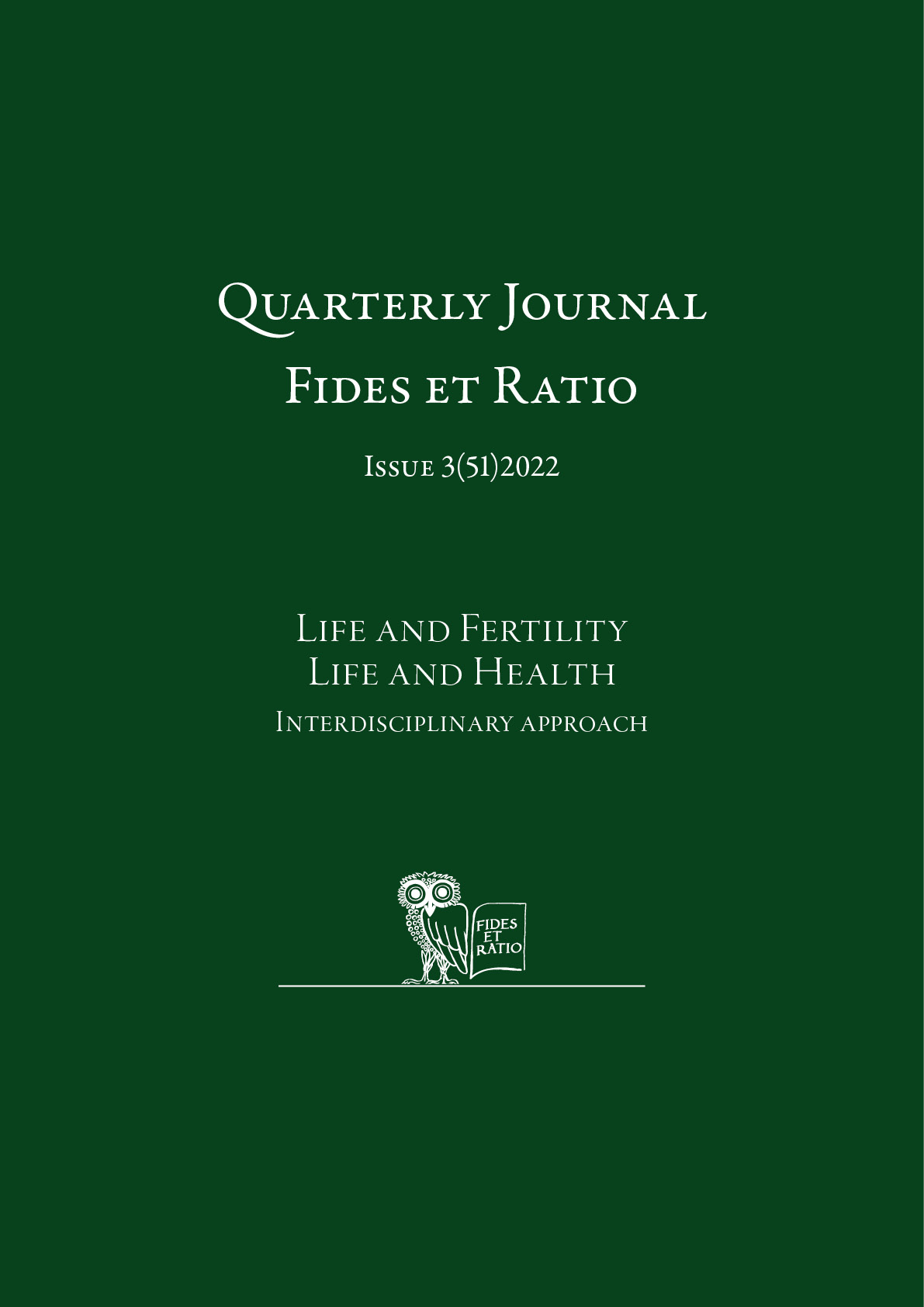Abstract
The presented paper analyses the interdependencies between the meaning of life and health. The noo-psychotheoretical concepts derived from the logotherapeutic trend of Victor Frankl (1984, 2009, 2018) and the phenomenon of health in salutogenetic orientation by Aaron Antonovsky (1979, 1992, 2005) have been compared. As a result, the importance of a sense of meaning in the process of achieving health and the essence of the sense of meaning as one of the elements of health have been outlined.
References
Aleksandrowicz, J. (1998). Zaburzenia nerwicowe, Warszawa: Wydawnictwo Lekarskie PZWL.
Ameli, M., Dattilio, F.M. (2013). Enhancing Cognitive Behavior Therapy With Logotherapy: Techniques for Clinical Practice, Psychotherapy, 50(3), 387–391.
Antonovsky, A. (1979). Health, Stress and Coping, San Francisco: Jossey Bass.
Antonovky, A. (1992). Can attitudes contribute to health? Advances. The Journal of Mind-Body Health, 8(4), 33-49.
Antonovsky, A. (2005). Rozwikłanie tajemnicy zdrowia. Jak radzić sobie ze stresem i nie zachorować, Warszawa: Instytut Psychiatrii i Neurologii.
Cierpiałkowska, L., Sęk, H. (2019). Teoretyczne i metodologiczne podstawy psychologii klinicznej, (w:) L. Cierpiałkowska, H. Sęk (red.), Psychologia kliniczna, 35-48, Warszawa: Wydawnictwo Naukowe PWN.
Eriksson, M., Lindstrom, B. (2006). Antonovsky’s sense of coherence scale and the relation with health: a systematic review, Journal of Epidemiology and Community Health, 60(5), 376-81.
Espnes, G.A., Moksnes, U.K., Haugan, G. (2021). Overarching Concept of Salutogenesis in the Context of Health Care, (in:) G. Haugan, M. Eriksson (eds.), Health Promotion in Health Care–Vital Theories and Research, 15-22, Springer.
Frankl, V. (1984). Homo patiens, Warszawa: Instytut Wydawniczy PAX.
Frankl, V. (2009). Człowiek w poszukiwaniu sensu, Warszawa: Wydawnictwo Czarna Owca.
Frankl, V. (2018). Wola sensu. Założenia i zastosowanie logoterapii, Warszawa: Wydawnictwo Czarna Owca.
Gierus, J., Popielski, K. (2011). Astma oskrzelowa. Perspektywa psychologiczno-egzystencjalna. Warszawa: Diffin.
Heszen, I., Sęk, H. (2007). Psychologia zdrowia, Warszawa: Wydawnictwo Naukowe PWN.
Heszen, I. (2019). Kliniczna psychologia zdrowia, (w:) L. Cierpiałkowska, H. Sęk (red.), Psychologia kliniczna, 517-540, Warszawa: Wydawnictwo PWN.
Keyes, C.L.M. (2014). Mental Health as a Complete State: How the Salutogenic Perspective Completes the Picture, (w:) G.F. Bauer, O. Hamming (red.), Bridging Occupational, Organizational and Public Health: A Transdisciplinary Approach, 179-192, Dordrecht: Springer.
King, L.A., Hicks, J.A., Krull, J.L., Del Gaiso, A.K. (2006). Positive affect and the experience of meaning in life, Journal of Personality and Social Psychology, 90, 179–196.
Lehman, O.V., Klempe, S.H. (2015). Psychology and the Notion of the Spirit: Implications of Max Scheler’s Anthropological Philosophy in Theory of Psychology, Integrative Psychological and Behavioral Science, 49, 478–484.
Lear, J. (2015). Freud, New York: Routledge.
Mascaro, N., Rosen, D.H. (2005). Existential meaning’s role in the enhancement of hope and prevention of depressive symptoms, Journal of Personality, 73, 985–1013.
Mittlemark, M.B., Bul, T. (2013). The salutogenetic model of health in health promotion research, Global Health Promotion, 20(2), 30-38.
Oberst, U.E., Stewart, A.E. (2012). Adlerian Psychotherapy. An Advanced Appoach to Individual Psychology, London–New York: Routledge.
Pallant, J.F., Lae, L. (2002). Sense of coherence, well-being, coping and personality factors: further evaluation of the sense of coherence scale, Personality and Individual Differences, 33(1), 39-48.
Park, C., Folkman, S. (1997). Meaning in the context of stress and coping, Review of General Psychology, 1, 115–44.
Pietras, T., Witusik, A., Mokros, Ł., Sipowicz, K. (2019). The paradigms of contemporary psychiatry, Polski Merkuriusz Lekarski, XLVI (272), 94-97.
Popielski, K. (2008). Noetyczne jakości Życia i ich znaczenie w procesie “bycia i stawania się” egzystencji, Chowanna, 1, 9-25.
Popielski, K. (2010). Zdrowie i choroba w kontekście bycia, rozwoju i stawania się egzystencji podmiotowo-osobowej, (w:) K. Popielski, M. Skrzypek, E. Albińska (red.), Zdrowie i choroba w kontekście psychospołecznym, 37-43, Lublin: Wydawnictwo KUL.
Popielski, K. (2018). Noetyczny wymiar osobowości. Psychologiczna analiza poczucia sensu życia, Lublin: Institute of Biofeedback and Noo-psychosomatic.
Reker, G.T. (1994). Logotheory and logotherapy: challenges, opportunities, and some empirical findings, The International Forum for Logotherapy, 14, 47-55.
Reker, G.T. (2000). Theoretical perspective, dimensions, and measurement of existential meaning, (in:) G.T. Reker, K. Chamberlain (eds.), Exploring existential meaning: Optimizing human development across the life span, 39–58, Thousand Oaks, CA: Sage Publications.
Reker, G.T. (2005). Meaning in life of young, middle-aged, and older adults: Factorial validity, age, and gender invariance of the Personal Meaning Index (PMI), Personality and Individual Differences, 38, 71–85.
Russo-Netzer, P., Ameli, M. (2021). Optimal Sense-Making and Resilience in Times of Pandemic: Integrating Rationality and Meaning in Psychotherapy, Frontiers in psychology, 12, 645926.
Schimmoeller, E.M., Rothhaar, T.W. (2021). Searching for Meaning with Victor Frankl and Walker Percy, The Linacre Quarterly, 88(1), 94-104.
Suchocka, L. (2011). Poczucie odpowiedzialności w zdrowiu i w chorobie. Perspektywa noo-teoretyczna, Warszawa: Wydawnictwo Difin.
Steger, M.F., Frazier, P. (2005). Meaning in life: One link in the chain from religion to well-being, Journal of Counseling Psychology, 52, 574–582.
Steger, M.F., Frazier, P., Oishi, S., Kaler, M. (2006). The Meaning in Life Questionnaire: Assessing the presence of and search for meaning in life, Journal of Counseling Psychology, 53, 80–93.
Steger, M.F., Kashdan, T.B., Sullivan, B.A., Lorentz, D. (2008). Understanding the Search for Meaning in Life: Personality, Cognitive Style, and the Dynamic Between Seeking and Experiencing Meaning, Journal of Personality, 76(2), 199–228.
Zamiara, K. (1992). Epistemologiczne założenia psychologicznej wizji człowieka, (w:) E. Aranowska (red.), Wybrane problemy metodologii badań, 12-32, Warszawa: Wydawnictwo Uniwersytetu Warszawskiego.
Urry, H.L., Nitschke, J.B., Dolski, I., Jackson, D.C., Dalton, K.M., Mueller, C.J., Rosenkranz, M.A., Ryff, C.D., Singer, B.H., Davidson, R.J. (2004). Making a life worth living, Psychological Science, 15, 367–373.
Vos, J., Vitali, D. (2018). The effects of psychological meaning-centered therapies on quality of life and psychological stress: A metaanalysis, Palliative and Supportive Care, 16(5), 1-25.

